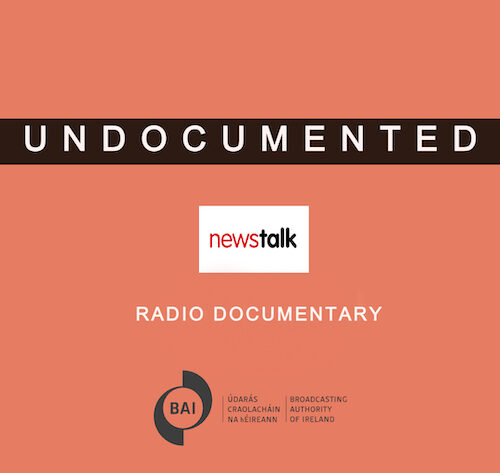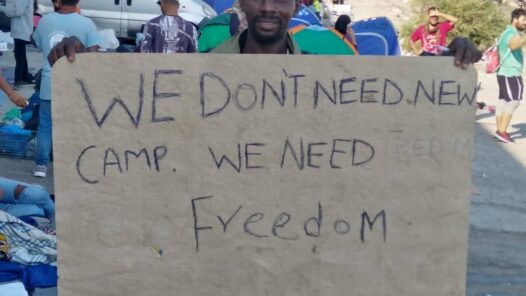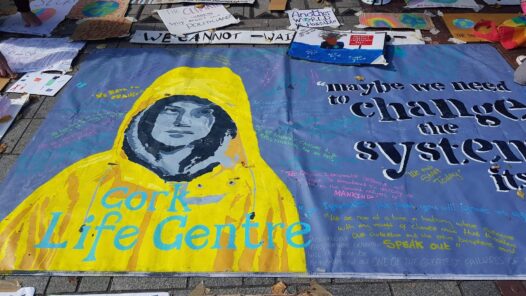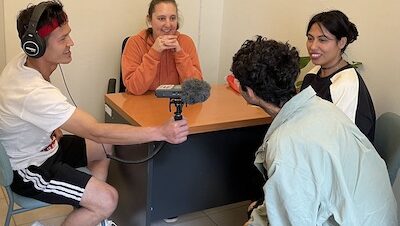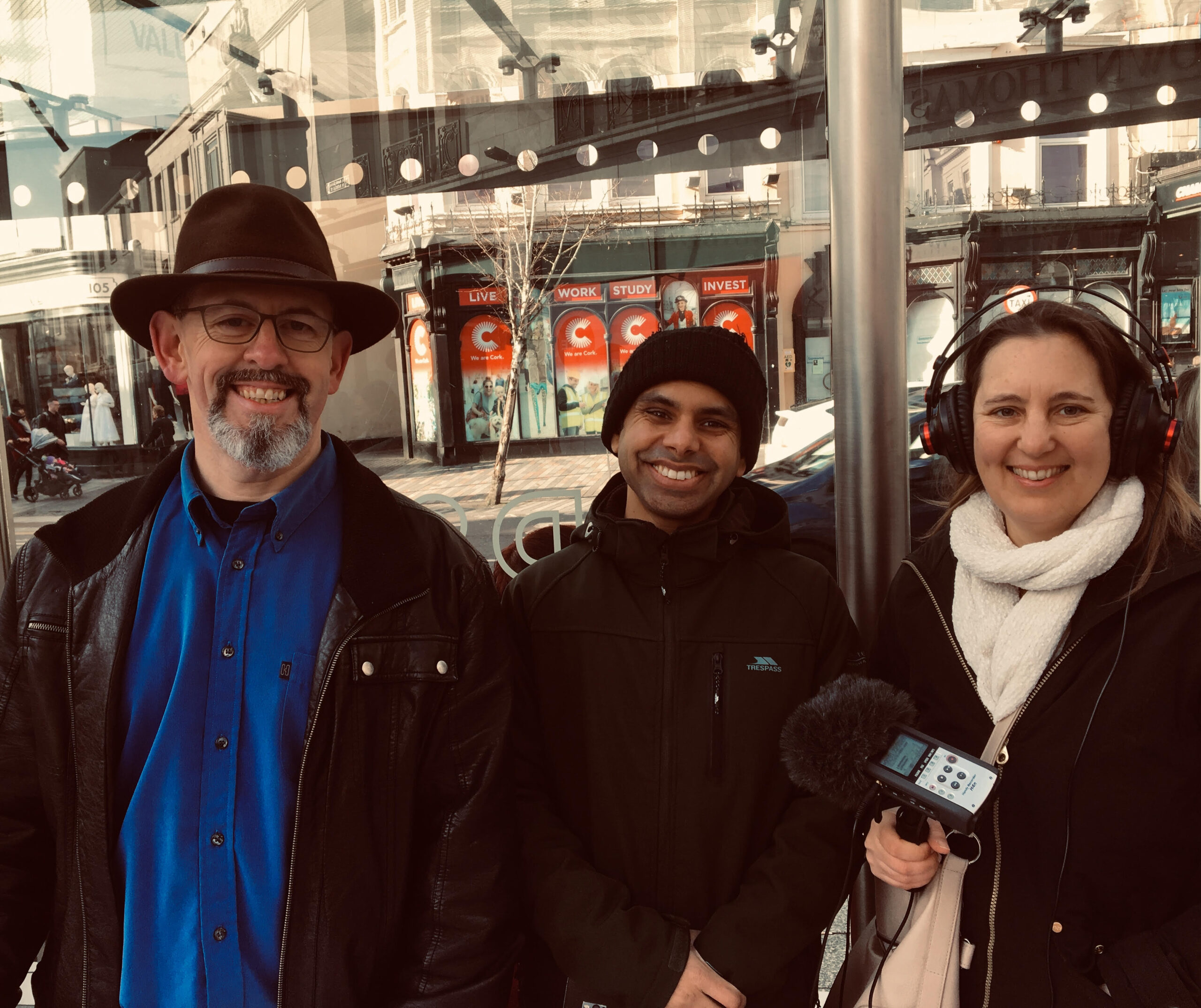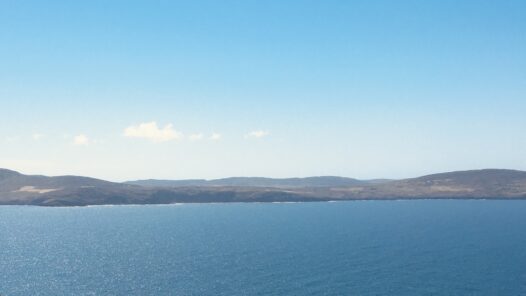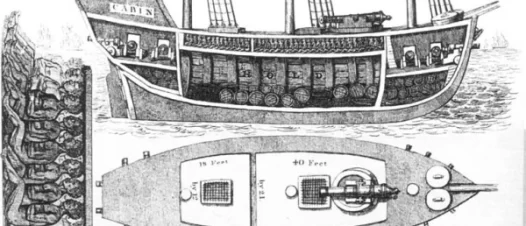Last year saw the start of a groundbreaking regularisation scheme for thousands of people who’ve been living and working in Ireland for many years without papers. It came after ten years of campaigning by migrant communities working with the Migrant Rights Centre Ireland (MRCI) in the ‘Justice for Undocumented’ campaign.
Albert Bello, Irene Jagoba, Neil Bruton and Claudiane Lima share their experiences of working on the campaign and why it’s so important to continue and broaden the scheme.
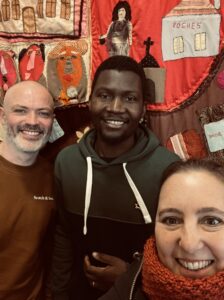
Bello and Jagoba share how it has affected their lives and they explain why it’s vital that this scheme continues for new arrivals. For them, and all the people who’ve been living in a state of limbo for so long, this has been a life-changing scheme. And for those who missed out and for those still arriving it offers a template for how we can continue to regularise migration in Ireland.
As of now, nearly 8,000 applicants have received a stable and secure status, with roughly 3000 people still waiting for their result. But some people – like Claudiane Lima who has been living in Ireland for nine years, with her children – didn’t qualify for the scheme. And there are people arriving all the time who could benefit from a continuation of a regularisation programme.
‘We know the life – it wasn’t easy,’ said Irene Jagoba. ‘We’re hoping that the scheme will continue without a closing date. So that no one – no undocumented people – will live undocumented for a very long time, because it was a tough life.’
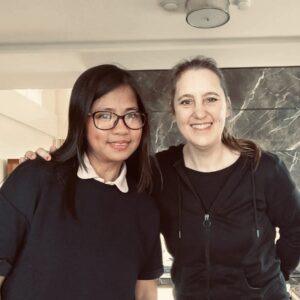
For more information on this ongoing campaign please go to the Migrant Rights Centre Ireland.
Produced for Documentary on Newstalk with the support of the Broadcasting Authority of Ireland (BAI) under the Sound and Vision Scheme.
TRANSCRIPT:
Albert Bello
That feeling when you are now free to go and come back. It’s a very nice feeling.
Irene Jagoba
It is a massive change for me and many others because I was able to go back home and visit my family and come back here to work and live in a normal life without fear. It is a dream come true.
Neil Bruton
You visibly see the weight lifted off people’s shoulders. People are in tears with the joy of this news. Because people have been waiting so long for this. They’ve been living very difficult lives here in Ireland. And that’s all changing now because of this scheme.
Albert Bello
It was incredible to join hands with some other fighters, some other undocumented people that I met here at MRCI. And here we are now that we are finally free. We can live a normal life like any other person will then be able to go back home and come back here to work and do other things like every other person here in Ireland.
Irene Jagoba
It worked really well for most of us who got it. So why not continue doing the scheme in the same criteria? With no closing date, so when they reach the certain year, they will be able to apply.
Bairbre Flood
Last year saw at the start of a groundbreaking regularisation scheme for thousands of people who’ve been living and working in Ireland for many years without papers. As of now, nearly 8000 applicants have received a stable and secure status, with roughly 3000 people still waiting for their result.
It’s hard to describe just how much this has affected the 1000s of people who’ve been living in a state of limbo for so long. Albert Bello, originally from Malawi, is chair of the Justice For Undocumented group.
Albert Bello
Things have changed now – everything have changed. Now I’m able to finish my degree because it was cut short. I will be able to travel to see my wife and my family as well. And thinking about all the things oh my god, I was like I was very happy.
It was incredible to join hands with some other fighters, some other undocumented people that I met here at MRCI to fight for the regularisation scheme. And thankfully, the government had to do the regularisation. And here we are now that we are finally free. We can live a normal life like any other person. We are able to go back home and come back here to work and do other things like another person here in Ireland.
I decided to join hands with those people that were already fighting like the others that have been fighting for 11 years. And so I decided to actually take action know for my own future and for my own advantage that I should be helped them to actually have the our papers, and it paid off because at the end of the day, the government had to say yes to the regularisation scheme. And it has changed thousands of lives, including myself.
When you are undocumented, you don’t live a normal life. You’re like living in the shadows. You have to hide every time. When you’re going to work you’re thinking maybe this is my last day in the state, maybe I’ll get noticed and get deported. So it’s really very difficult to actually do a proper campaign for the regularisation. But with the backup of this vigilant men and women that I’ve found, I could hide behind them and actually do the campaign. It’s a difficult situation to do, but still more we really needed the regularisation scheme to change things. So that’s how it happened. and with the help of the Migrant Rights Centre, we could be able to actually do it together.
I stayed from 2016 when my visa was expired til last year when I got got my papers.
Bairbre Flood
Yeah, yeah, that’s that’s a long time.
Albert Bello
Yeah, a very long time, very long time. And I remember in 2019, and 2020, was very tough, because we could hear a couple of people were getting deported from workplaces, some were in the streets being caught and being sent back to different countries. So it was very terrifying, because you do realise maybe it’s going to be me next year. And then that would be the end of everything. But again, looking at how I’m surviving, maybe getting a little bit of something, when I’m working here and send to my family, I could still stay because life back home is very tough. There is high rate of unemployment, and it’s not easy to get a job. So still more weighing the options, the only option was to keep on staying and to keep on working.
And it was very tough, because in 2017, something worse happened. I lost my brother, and you can imagine I couldn’t travel to actually mourn with the rest of the family.
That’s why I said it would be better for government to introduce a legalisation process, which can be ongoing, so that not people should be living, long term undocumented in the state. We have a clear proof that it’s working and it’s life changing – if we look at the thousands that have been regularised, at the moment, with this scheme.
When you are undocumented, it’s really very tough. And the fact that you can’t do – you can’t live a normal life, like any other person is really very disturbing. Every time, for example, I was working and there were so many internal vacancies that I could apply to progress with my career in my job, but I couldn’t apply because maybe the bosses couldn’t know that I’m undocumented. So they couldn’t do that. Because maybe they could notice to say, where is your visa? You see, that would have been the end of me. So you, you just keep quiet.
Even if the opportunity is there, you can’t you can do it. And the other thing is, when you see a crime or somebody commits a crime against you, you can’t even go to report it. Of course, there is nothing like maybe you will be noticed like that, as far as I know. But you have that fear to say maybe because I’m illegal. If I go to report this, maybe get noticed and then that will be the end of me staying here. Even if you if you are sick, you see, you can actually peacefully go to seek a medical doctor or government hospital. You’re like maybe I’ll get noticed. There’s so many things that I can give like an example. So in short, I can say it’s difficult for you to live a normal life.
You can’t plan for your future. Because maybe you’re here today. Tomorrow might not be there, you’re deported. You’re gone so you’re living like one leg is already out of the country. So it’s very difficult – it’s something which you can’t plan for the future. You’re not settled or psychologically you’re not settled. Everything is is like you haven’t yet started anything. What you benefit is like you’re working and you get paid. You support your family back home. Aside from those things there is not any proper freedom
I found already so many that my colleagues have done of course they were doubts that maybe it won’t happen but you know, when you have a collective voice, you fight together, so many actions we did together. Because we have been tweeting the Minister of Justice, we have been sending postcards to her, and so many things. And she has been very good to us. Because every time some of our colleagues had to meet her in person. So that was very helpful, because we see the government actually lending a helping hand to us. Because you can be doing the campaigns, but if the government doesn’t listen to you, it doesn’t do anything positive. So we are very happy that the way they handled us, the way they welcomed us. They welcomed the idea of having the scheme and stuff like that. So it really helped and thousands are living a normal life now.
I have got so many Irish friends. And I’ve been to so many places, like Ashbourn, Mayo, Dunboyne, and I’ve been to Cork I’ve been to Wicklow, I’ve been to across so many places. Yeah. So the people are very friendly. And I have so many Irish friends that have been very friendly to me. And the time I lived, though they didn’t know I was undocumented. So but sometimes you just decide to do forget about everything, and then just leave like that, like nothing is happening in the background. So I could just be happy to say once something bad happens, it has happened, you know. So with that attitude, they couldn’t notice that maybe I’m undocumented.
We could see we are part of the economy, because we did a survey to find out about this cause in the undocumented, Justice For Undocumented group, we have like over 2000 members that are living – that were living undocumented – some of them regularised now. So when we did the survey, there are so many people working in care home, others, they’re working in food production, others are working in the meat factory, others are working in the farms, so many areas. So we can see. We are contributing positively towards the development of the country, because we do contribute like millions in taxes a year. So that’s something which we said, we can move on to beating more because we will be working freely. And does this does something bad. On the government side. It’s a benefit. It’s not it’s not a burden. So we when we asked them, they could easily understand that because the they have the figures. They know how productive we are. So that’s why I said if the government consider a progressive like regularisation scheme, it’s it’s it’s good for them as well financially, economically, to boost the economy of the country. There are so many people with different talents, different ideas that they can freely do it, if they have the, the status, and then they’re free to do anything they can do. And they contribute positively towards development in the country.
When you don’t have a status, it’s not a good thing. It’s a very bad thing. So you don’t live a normal life. People are living – those that got their status – they’re living a normal life now. Like say, for example, myself. I’m here working, working hard. Because I know in a few months to come, I can travel. You see, I am busily working with all my mindset on my job, because I know that maybe in few months to come, I can travel my country, see my wife, see my family and come back to work. But when you are undocumented when you are you don’t have a legal status. You don’t have that in mind. Where like in in a cage or in a prison. You don’t have that freedom. Even you have money you can travel. It’s like, I used to have like enough money to book an air ticket and go back to my country. Come back here, continue working, but you couldn’t do that you can just send money, and that’s it. But now, a few months to come up, we’ll go to Malawi. I have like a freedom to travel and see my family. I will miss them for just a few months. I don’t miss them, like for years like it used to be. It’s normal for human beings to be meeting relatives time and again, when you’re far from home. So when you don’t have that access, it’s terrible. Yeah, so it’s very good to have a status for everybody, so that will then be able to travel to our countries and come back.
Neil Bruton
The real ethos of everything we do here in MRCI, is that people affected by issues should be at the heart of campaigning for change. We often say those closest to the problem are closest to the solution.
Bairbre Flood
Neil Bruton, campaigns coordinator in MRCI, the Migrant Rights Centre Ireland,
Neil Bruton
A group of five people 11 years ago came together for a meeting to try and think about, you know, they all knew that they were all in the same situation undocumented, and they started to think about what can we do as a collective to bring about change for everyone who’s in this situation. And over the years, the campaign has grown from those five people, and to 2500 and more undocumented people as part of the community and campaign. And I think it’s just shown me that everything you do is stronger when you have people affected at the heart of it. If you’re taking action, it’s much stronger with people affected. If you’re doing media, it’s much stronger with people affected, if you’re doing a survey, they’re the ones that go out and get people and you can build your evidence. So I would just say that everything is stronger when when people are affected are at the heart.
And I suppose just it’s been an amazing experience to see the bravery of people. Because it’s not an easy thing to say I’m here, I’m undocumented. And so many undocumented people have done that, not knowing what the impact would be on them. But they’ve done it because they wanted to stand up for themselves. And for everyone else who’s going through this.
And, you know, there’s one of the founder members, Jason speaks about the very first time he was actually the very first undocumented person in Ireland to speak openly about being undocumented. And I was at an event down at the at the Liffey there and anti poverty event. And he speaks of a garda car just happened to pull up at the time while he was speaking. And he was trying to continue his speech. And all he was thinking inside his head is this is the end for me. They’re they’re pulling up to come and get me. Of course they weren’t. But it just shows the bravery that he had to show in order to be out there and speak about being undocumented and radius people like him, and other people you’d be talking to today who were really involved in the campaign.
I’m organising meetings here and helping people come together as my job. But it’s undocumented people who are driving this campaign and coming to our strategy meeting on a Wednesday night at seven o’clock are probably coming off a 12 hour shifts, looking after an older person in their home or coming straight from, you know, a meat factory where they’ve been working for nine hours in the day. So, yeah, it’s absolutely phenomenal that people have been able to show such commitment to this campaign over over 11 years. At the start is a huge thing, just about raising awareness, you know, and of what it means to be undocumented and the challenges that someone faces in that, like in Ireland, we’re probably a little bit easier because we have our own undocumented population in other countries, so but I think there was just a big period of raising awareness and, and just trying to get this onto the agenda onto the political agenda.
So you know, building allies, building political allies, building other organisations that supported the work, and then starting to take action starting to try and get people to notice that undocumented people are here and willing to speak out. And over the years, you know, ad the campaign has done all sorts of things that have been 24 hour vigils. They’ve been banner drops. They’ve been human shamrocks on the beach in Sandymount. They’ve been obviously a couple of surveys, which were really important in kind of showing, you know, the work people were doing, the contribution they were making, how long they were here, the different sectors they were working in, and did they have children, all of that, and I think that really helped and, you know, showing the government a better idea of who we’re talking about what the population is, you know, what sectors they’re working, so that if they would bring in a regularisation what that would mean.
And so yeah, I mean, a huge amount has gone into it, and it’s like Yeah, it’s kinda like an overnight success 11 years in the making, you know. And I think, you know, certain things happened, I think in the lead up that were really important certainly in the the formation of the last government, there was a huge push by the campaign, and to push for this as part of the programme for governments. And that included a variety of different actions trying to target those who are likely to be in the government and really try to show them that this was something that was really important and and should be part of the programme for government. And I think, luckily, the campaign was able to get that included in the programme for government and then that that led to it actually becoming a reality.
Irene Jagoba
My name is Irene Jagoba, and I’m originally from the Philippines. I’ve been living and working in Ireland for over 15 years now. And I just recently got my status last year 27th of March, and it’s life changing. It is a massive change for me and many others, because I was able to go back home and visit my family and come back here to work and leave in a normal life without fear.
My son has, he was born with a congenital heart disease. And I had a good life back home and I have a party shop, I have a a diner, which makes our life just normally. And until I have my son who has a congenital heart disease. I was said that he’s only going to live for a week. But I said, No, I don’t believe like, as long as my son is fighting for his life, then I’ll go fight in him. So I spent everything just to make him better. I came here and I started working as a child minder, and then for a private family, and then it was it wasn’t that easy. So my visa is about to expire. And I was thinking of when I go home, I want to see my son, but but he was very limited, like I don’t have enough money to bring back home and continue his medication. But I said I have to decide how to make a big decision. So I stayed overstayed and continue working and sending money for his medication, my daughter’s education.
[MUSIC]Bairbre Flood
Irene Jagoba, campaigner with Justice For Undocumented continues to tell us about why this campaign is so important…
Irene Jagoba
It wasn’t easy, because as I mentioned, if we go out as we get out the house, we don’t know what are we going to encounter. Like, you’re afraid if the guard will just if there’s anything or check, you might be sent home, you know, those fear that if you get sick or something, we’re so afraid to go to the doctor to the hospital, they’re looking for PPS number, and we don’t have that. And just buy something in the counter like paracetamol. And it take long sometimes, especially when you need antibiotics, they won’t give it to you encounter.
But we live like that most of us, some are very brave to try and apply for PPS number and they they manage to. But most of us, like general speaking in life of undocumented people, we don’t even have especially those working live in, in their employee with their employer. They don’t have enough evidence like proof of address proof of billing. So what will you present, we only have passport, most of us, we don’t have the bank account. And so it wasn’t really easy. Those things are kind of make our life difficult.
We’re not able to go home like in the to meet our family and decide this and the happiest moment in our lives. And looking after the kids here really well because it’s our work. And of course your it’s your responsibility. As a child minder, we’re doing it really well. And you will feel like the worst mom in the world because you can’t do it for your own kids. Here. No, Skype and Yahoo Messenger was during that time. So I was still doing and helping my kids homework through Skype, and there’s no Viber and WhatsApp yet, or messenger that Tony or normally call if it’s emergency. So it is not easy, really.
It’s like no contract, it’s just verbal, that you will work from half seven to help seven. Oh, god, it’s it’s lovely. And sometimes it never happened, that it’ll finish at half, seven, half, nine, half the end, they’re not home yet. So just keep working no extra. But at some are in a very good working condition like when they’re finished or gone home. But I worked like that for seven years, both things change when I decided to move to Dublin.
And I met people that are involved in MRCI campaign. So I was invited to attend a meeting. I was worried. Because who are these people? You know, you have no idea yet. So I said to myself, there’s nothing wrong, I can go because I want to meet people like me in the same situation. So we would know what to do. What’s the solution? Because we’re all looking for a solution.
And then I was invited to attend the first activity because it just is for undocumented campaign always do something for St. Patrick’s Day, too, because you know, the Taoiseach always go to America to lobby the situation of undocumented people Irish in the US. And we were always saying that what about us? We were here. So I was invited to that action. And we were in Sandymount strand. And I also invited because I was really afraid what is gonna happen here I invited a friend who can draw you and two more. I know three more undocumented people that I know but they don’t admit to me that they’re undocumented too. But I feel that we are just safe. So I invited them to come over but we’re in a car – my friend’s car. So we attended like in case we can run away yeah, but we’re not doing anything wrong. We just but it was funny because of the fear. You know? Think of those kinds of things because of fear.
But then it was really good. We met people the same as us. And the four of us admitted to each other that yes, we need to join this campaign. And to be aware of what we can do what we can’t do here in Ireland, do we have any rights as a human as a worker, and MRCI is very good in providing all those information to us in the drop in centre, and they do like know, your rights sessions as well. So I said, Oh, wow. They’re doing a very good job. And I would like to get involved in in the campaign. Yeah. And they have this Leaders Group, they meet regularly, every Tuesday and Thursday. So twice a week.
After work, would you believe after work so there tarde from long day, and then meet together? There are nine people meeting together to plan on the campaign? What’s the next step to do? How can we be visible to people? And yeah, to give also the government a an information that yeah, we exist, and we need the solution. So I joined that Leaders Group, become involved in many activities like this in the campaign. Of what I did is I use my self as an example that look I’m undocumented, but I step up and become visible.
I started doing media. And, and all this organising within Can you see me now, it’s like an exhibit with life size photograph in somewhere in Temple Bar. We did a lot of calls to show the government that we’re here we exist, we’re working. And also, not everyone has the same interest. Of course, some are in political thing. Some are just being a connector community connector. So we started strategy group with Neil, community development worker who is focusing on the Justice For Undocumented campaign. And yeah, we started the fellowship, myself and Tunasi, she is my fellow that started this, and then we continue doing it.
Bairbre Flood
By this time were ye beginning to get frustrated? What was your feeling?
Irene Jagoba
No, I’m just like, I kept myself hopeful. I know, change will happen. I said, I feel it. I know it well, as long as we will be like, you know, heated and fighting together. We felt like we found family. In the justice for undocumented campaign, we are people in the same shoes, the same belief, like, you know, I don’t know, like there are different situations back home, different backgrounds. But here we are family. So it was it was really good.
We learned a lot from each other. And different contributions from and working in a diverse group is also very good to know. We learned from Mauritian…Pakistan…we were like United Nations working together! But yeah, different traditions. We’re sharing even food ideas. Yeah, there are so members who are sending me a text or giving me a call or meet up for coffee to say thank you for encouraging me to join the campaign: ‘I now work in Aer Lingus as check in attendant, I’m very happy now with a very good employer good company. And I’m in a proper employment.’
The day I got the letter I don’t know what to feel. I was so happy. And I immediately rang Neil in MRCI and said ‘I got my paper!’ and I took a selfie and I like this and I showed Neil. And they posted it. And I had another media interview after that as an example that the scheme is true. It’s happening. I got my paper from the scheme because it’s also a good example to encourage the other undocumented people to apply for the scheme. Because the others are qualified, are eligible to apply for the scheme. But they thought they it’s just a government trap to catch them. And so I said, ‘No, I’m proving to everyone that got my paper from this scheme’, I will be able to travel and see my kids back home to visit and come back here and work again.
Bairbre Flood
That’s cool. Did you go back last summer? When did you go?
Irene Jagoba
Yeah, I went September, and it was my daughter’s 23rd birthday. And she was very happy that I was there. And yeah, it was a surprise visit. And my son stepped back the first time he saw me, and ‘do we really have a mom?’ and the sister – my daughter said, ‘Oh, no, that’s my mom’. She started crying and my son, just come over and give me like a group hug tight. And yes, we have our mom.
So we were just reunited and had a very happy. Those days. I only have a few days in the Philippines because I have to go back to work. And we spent our days just together the three of us, just us. And I said yeah, I promise I can come back now. Unlike before that I always have, I might go home next year, or next year until 15 years, like nothing. So it was I was afraid. I was nervous. The plane is landing. It was like I don’t know, am I crying? Oh my goodness. Because they might ask me ‘Where were you before?’ You weren’t here with us? You know? And they could be mad or they could be like, upset that you left me for long? Like I don’t know what to hear from them. But no, everything is the we’re very good kids. Yeah, I got a good welcome.
But this time, I’m coming home, I’m booked. And they know that I’m coming and I’ll be there for my son’s 18th birthday. He doesn’t have plans for a big party, but as simple swimming with all his favourite people. And yeah, I’ll spend my whole three weeks with them. Like, you know, counting the days, it feels different that you know, you can come home. Unlike before, it’s impossible. You don’t even know if the you you’re still gonna see them you know, Life is uncertain. Something changed something happened to you. Or they’re you never knew you’re gonna see them again. So it is really, really big thing this scheme for us.
We are thankful as well, especially to MRCI for for leading us in the campaign and staying with us. You we will not do this – we won’t stand up if they won’t stand up with us. So it’s a big thank you for them. And the Minister for Justice, this Helen McEntee for doing all this the these things as well. It worked really well for most of us who got it. And it changed many people’s life.
And yet the contributions that we are making now for the government and for the economy is is really good help. So why not do and continue doing the scheme in the same criteria? With no closing date, so when they reach the certain year, they will be able to apply?
Neil Bruton
It’s really heartbreaking, you know, when especially we had some people coming in thinking they were eligible, and then we had to obviously tell them but that they weren’t. And often they were, very, very close to the criteria. And, and like obviously, I’ve commended the government on introducing this scheme, but we would have obviously liked for it to have been broader and to have been more inclusive than it was. And for example, you know, the you had to meet the criteria on day one that the schem e opened.
So the main criteria being four years undocumented residence, but the scheme was open for six months. So some people reached that four years, a day or two later or a week later or two weeks later. So they had the four years the scheme was open but they couldn’t apply. We’d other people who had maybe a long legal residence here. So for example, some people would come as a student, originally, they’d complete their studies, but then they wouldn’t be able to find work that was eligible for a work permit. And they’d make the difficult decision to stay and try to live on documented here, and to make a better life for themselves.
But some of those people might have had seven years legal residents, and then only two or three years undocumented, and for them it was very hard to understand, you know, why is someone who is maybe only four or five years here able to get their papers, but I’ve 10 years, 11 years, and I can’t, so that was very difficult for people as well. And then there was people who kind of fell between the two schemes, they had some time in the asylum process and some time undocumented, but for some of them, they couldn’t apply for either.
And that was very difficult for people too, so I suppose you do have these people who are very close, but who are unable to apply and and, you know, as I say, we would really call on the government to build on on this progressive approach to immigration. And it’s been absolutely life changing, but we need to see a continued into the future so that those people can be can be looked after. And so that nobody who is living undocumented in Ireland has to do so long term.
Claudiane Lima
Unfortunately, I had a visa for less than a year in 2020, it broke my undocumented residents here, it was very short, we were trying to do things right. But it makes me excluded from the scheme, you know.
I’m here altogether nine years now, and my husband here is here nearly 12 years, I have three kids with them living here with me, they are going to school, they love Ireland, they don’t know nothing about our country any more, you know.
We thought we could benefit from this scheme. And then when they let the rules come out, we saw that we couldn’t do so it was like a nightmare. It was going to be a dream come true. And then it just turn into a nightmare. We get undocumented and trying to hide ourselves, you know. So it’s a bit harder.
Now I know other people’s who is in the same situation as me. Some of them didn’t get it because they didn’t have all the papers to prove the residents they have stamped when they went thin in the the airport. But they didn’t have bills here to prove the residents because they were afraid of registering or donating, you know, so that’s why they didn’t get it as well. There are so many people still behind. So it’d be great if they had an ongoing scheme like that many other countries has it. And there’s some Irish people can get it in another country when they tried to get a better life as well. So it would be great if they do the same for us here.
I live in Ballyhaunis, the enterprise centre looking to our side always, you know, we have 43 nationalities here, just living in Ballyhaunis. So they keep open it, they help to to share it to everyone. I brought them into Enterprise Centre flyers. They help us to share this as well. So oh, it was very good. It was a dream for many people. I know it helped a lot as well. And that they always stand by our side when we need something, you know.
We can’t go to Brazil for holidays. I lost my grandfather. I couldn’t go. So it’s a bit hard for me. It’s hard to be undocumented here. You’re afraid of everything – you’re afraid when you see a guard at the street. You afraid everytime government announced any change in the immigration services as well because you never know what’s going to happen if they make a big change and start to go to get the undocumented peoples for deportation or this thing so you are always afraid of something.
Neil Bruton
There are ongoing regularisation systems in other European countries like France, Spain, Portugal, so we wouldn’t be an outlier if we did this and really it would remove the need for schemes like this. We had people applying for the scheme who were 10, 15, even 20 years undocumented, living through all the difficulties that that places on people in their work in their lives in their mental health, and if we just have an ongoing system like that people wouldn’t have to go through that.
Irene Jagoba
We know the life, it wasn’t easy. We are hoping that the scheme will continue without a closing date. So that no one – no undocumented people – will live undocumented for a very long time, because it was a tough life.
Albert Bello
It’s life changing, I should say, very life changing to have the scheme. So I’m sure the government will think about that, to put like long term regularisation process. There are so so many people that are living undocumented. I ask the government, it’s an appeal to the government, if they can consider putting a regularisation process which can be long term, to regularise those people that can be living undocumented here, so that nobody should be left out. Nobody should be living here for long term being undocumented, because I’ve passed through the same and I know how difficult it is.
Bairbre Flood
A huge thanks to Albert Bello, Neil Bruton, Irene Jagoba and Claudiane Lima for talking to me for this programme, and to all the people who worked on the justice for undocumented campaign over the past 11 years.
For more information on this ongoing campaign, please go to the migrant Rights Centre Ireland – mrci.ie
Thank you for listening
